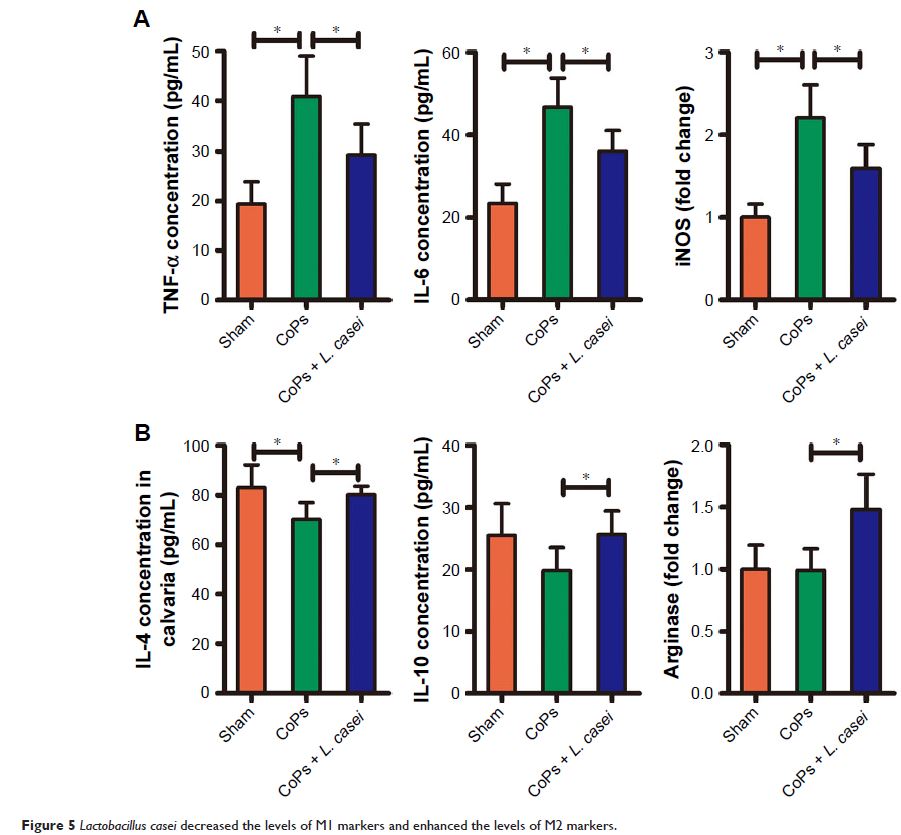109451
论文已发表
注册即可获取德孚的最新动态
IF 收录期刊
- 3.4 Breast Cancer (Dove Med Press)
- 3.2 Clin Epidemiol
- 2.6 Cancer Manag Res
- 2.9 Infect Drug Resist
- 3.7 Clin Interv Aging
- 5.1 Drug Des Dev Ther
- 3.1 Int J Chronic Obstr
- 6.6 Int J Nanomed
- 2.6 Int J Women's Health
- 2.9 Neuropsych Dis Treat
- 2.8 OncoTargets Ther
- 2.0 Patient Prefer Adher
- 2.2 Ther Clin Risk Manag
- 2.5 J Pain Res
- 3.0 Diabet Metab Synd Ob
- 3.2 Psychol Res Behav Ma
- 3.4 Nat Sci Sleep
- 1.8 Pharmgenomics Pers Med
- 2.0 Risk Manag Healthc Policy
- 4.1 J Inflamm Res
- 2.0 Int J Gen Med
- 3.4 J Hepatocell Carcinoma
- 3.0 J Asthma Allergy
- 2.2 Clin Cosmet Investig Dermatol
- 2.4 J Multidiscip Healthc

益生菌保护小鼠免受 CoCrMo 颗粒引发的骨质溶解
Authors Wang Z, Xue K, Bai M, Deng Z, Gan J, Zhou G, Qian H, Bao N, Zhao J
Received 17 December 2016
Accepted for publication 30 June 2017
Published 27 July 2017 Volume 2017:12 Pages 5387—5397
DOI https://doi.org/10.2147/IJN.S130485
Checked for plagiarism Yes
Review by Single-blind
Peer reviewers approved by Dr Akshita Wason
Peer reviewer comments 2
Editor who approved publication: Dr Linlin Sun
Abstract: Wear
particle-induced inflammatory osteolysis is the primary cause of aseptic
loosening, which is the most common reason for total hip arthroplasty (THA)
failure in the med- and long term. Recent studies have suggested an important
role of gut microbiota (GM) in modulating the host metabolism and immune
system, leading to alterations in bone mass. Probiotic bacteria administered in
adequate amounts can alter the composition of GM and confer health benefits to
the host. Given the inflammatory osteolysis that occurs in wear debris-induced
prosthesis loosening, we examined whether the probiotic Lactobacillus casei could
reduce osteolysis in a mouse calvarial resorption model. In this study, L. casei markedly protected
mice from CoCrMo particles (CoPs)-induced osteolysis. Osteoclast gene markers
and the number of osteoclasts were significantly decreased in L. casei -treated mice.
Probiotic treatment decreased the M1-like macrophage phenotype indicated by
downregulation of tumor necrosis factor α (TNF-α), interleukin (IL)-6 and
inducible nitric oxide synthase (iNOS) and increased the M2-like macrophage
phenotype indicated by upregulation of IL-4, IL-10 and arginase. Collectively, these
results indicated that the L. casei treatment
modulated the immune status and suppressed wear particle-induced osteolysis in
vivo. Thus, probiotic treatment may represent a potential preventive and
therapeutic approach to reduced wear debris-induced osteolysis.
Keywords: wear particles, gut microbiota, nanotoxicity, macrophage
polarization, inflammatory cytokines, aseptic loosening
